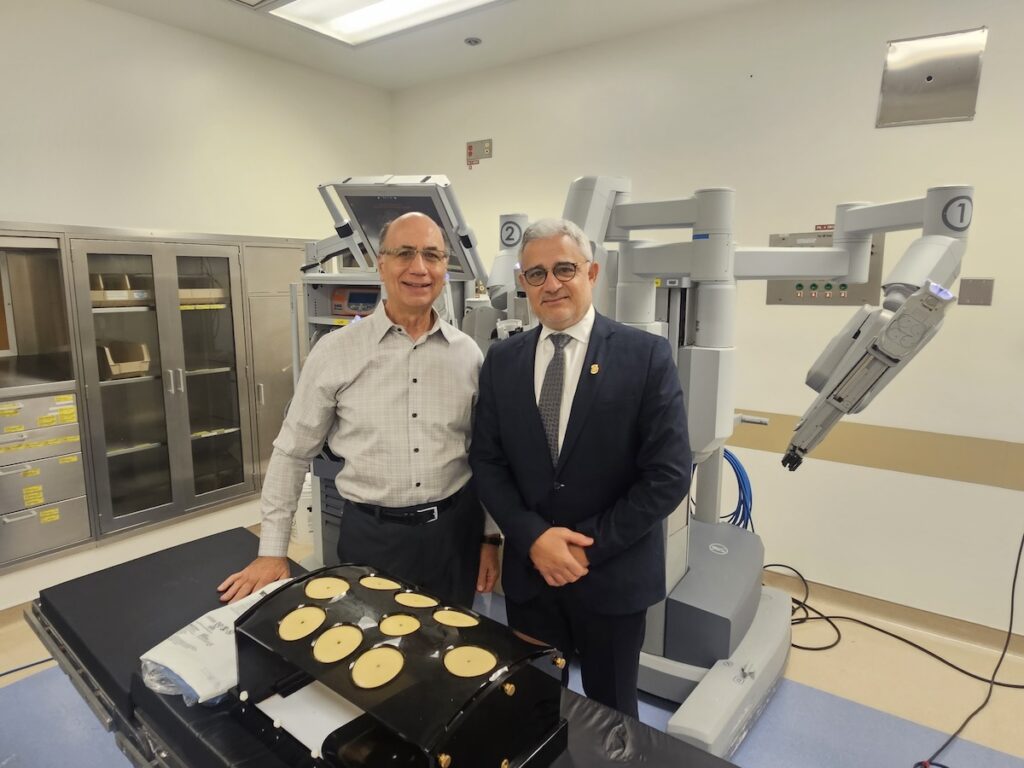After giving birth to her daughter, Catharon “Cat” Miller began noticing changes in her ability to focus.
“I’m a bit of a nerd, so I used a spreadsheet to track things like when my daughter slept and when we fed her,” Miller said. “I remember one afternoon I was trying to read the spreadsheet, which was incredibly simple, and I couldn’t do it.”
Miller had the same difficulty when trying to comprehend other written materials, such as recipes or news articles. A business school graduate who was normally incredibly efficient and productive, Miller didn’t feel like herself. Although she knew something was wrong, she couldn’t pinpoint the root cause, so assumed it was simply the result of being a new mom.
It wasn’t until two years later that Miller considered whether something she was eating might be affecting her ability to focus.
Thanks to family friends Laura Davis, inaugural chair of the newly formed Celiac Disease Center’s Leadership Council, and Tony Davis, Miller learned about the University of Chicago Celiac Disease Center. After visiting the center, she was diagnosed with celiac disease, an autoimmune disease where the ingestion of gluten leads to damage in the small intestine.
Researchers at the Celiac Disease Center, including the center’s director of research, Bana Jabri, MD, PhD, have long understood the acute physical symptoms of celiac disease, including nausea and abdominal pain after consuming gluten. But only recently have researchers begun to explore the disease’s neurological and psychological impacts.
To further understanding of the gut-brain connection in celiac disease, Jabri is embarking on a new research project in collaboration with Jean Decety, PhD, Irving B. Harris Distinguished Service Professor in the Department of Psychology, and Sonia Kupfer, MD, associate professor of medicine. The first-of-its-kind study aims to determine if gluten ingestion causes the “brain fog” symptoms reported by Miller and other celiac patients. Such symptoms can range from the difficulty focusing that Miller described to anxiety, depression, irritability, poor sleep, and panic attacks.
Encouraged by the promise of this research, Cat and her husband, Brian Miller, a University of Chicago Medical Center trustee, donated $750,000 to advance the project.
“We are excited to support this foundational research, which will not only advance our understanding of the mechanisms underlying brain fog among celiac patients, but could also lead to larger studies and new therapies that target this at a neurological level,” Brian said.
As the first broad, controlled study investigating how gluten exposure affects the brains of people with celiac disease, the study will evaluate patients who experience neurological symptoms following gluten exposure, as well as a control group of non-celiac patients.
Unlike other autoimmune diseases, where the trigger for symptoms is often unknown or involves a myriad of complex factors, the cause for celiac disease symptoms is clear—gluten ingestion—and therefore can be safely controlled in a research setting.
Using Decety’s expertise in functional magnetic resonance imaging (fMRI)—a non-invasive technique to examine the brain—study participants will undergo fMRI, blood testing, and psychological assessment before and after gluten ingestion.
“We are really lucky at the University of Chicago to have such strong relationships between clinicians and scientists across campus,” Jabri said. “Together, we can design rigorous studies that leverage our cross-disciplinary expertise.”
Based on mounting evidence, Jabri suspects that cytokines, small proteins released following gluten exposure in individuals with celiac disease, not only cause gastrointestinal distress but also lead to alterations in brain function. The study will determine if cytokine release is the culprit behind brain fog.
“It is a terrible experience for a patient with symptoms to be told that there is no explanation for it,” Jabri said. “So just being able to tell patients they are not imagining these symptoms is going to really help people. But beyond that, I’m hoping that this initial study will seed many future studies, and help us understand brain fog from both a scientific and psychological perspective.”
In addition to shedding light on gluten’s impact on cognitive function among celiac patients, discoveries from this research study may offer insights into neurological issues reported by patients with a variety of conditions—from cancer to COVID-19 to other autoimmune diseases like inflammatory bowel disease and multiple sclerosis.
Beyond developing new treatments, Cat hopes the research will improve understanding and support for children and adults affected by celiac disease, along with people experiencing brain fog due to other conditions.
“Learning more about brain fog and being able to identify it as a demonstrable medical phenomenon will make many patients feel better and help them understand that they’re not going crazy,” Cat said. “It would be an incredible thing for there to be more understanding and acceptance around the psychological and emotional impacts of celiac disease, both for kids who are struggling in school after accidental gluten exposure and for adults facing challenges in the workplace.”
Jabri is especially grateful to the Millers for their support.
“This is a perfect example of why philanthropy is needed to advance science,” Jabri said. “If I went to the National Institutes of Health with this project tomorrow, there’s no chance it would get funded because we don’t yet have the preliminary data. Philanthropic funding is the driver that allows us to explore innovative ideas and opens the pathway for new research directions.”
Published February 2021




